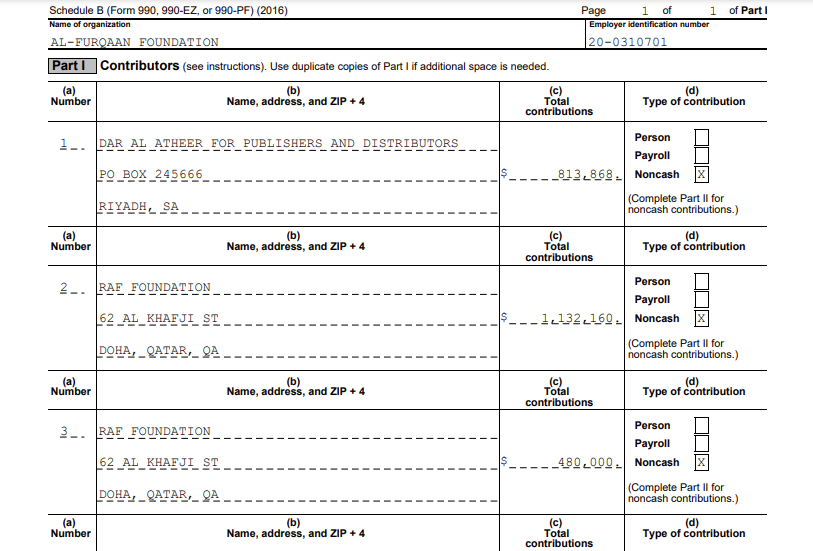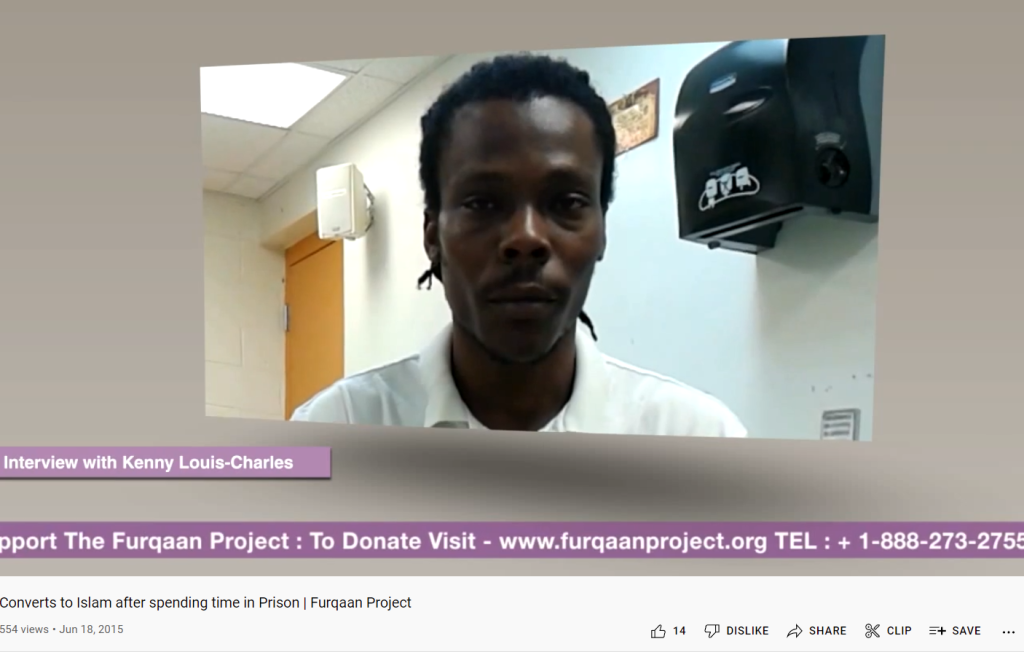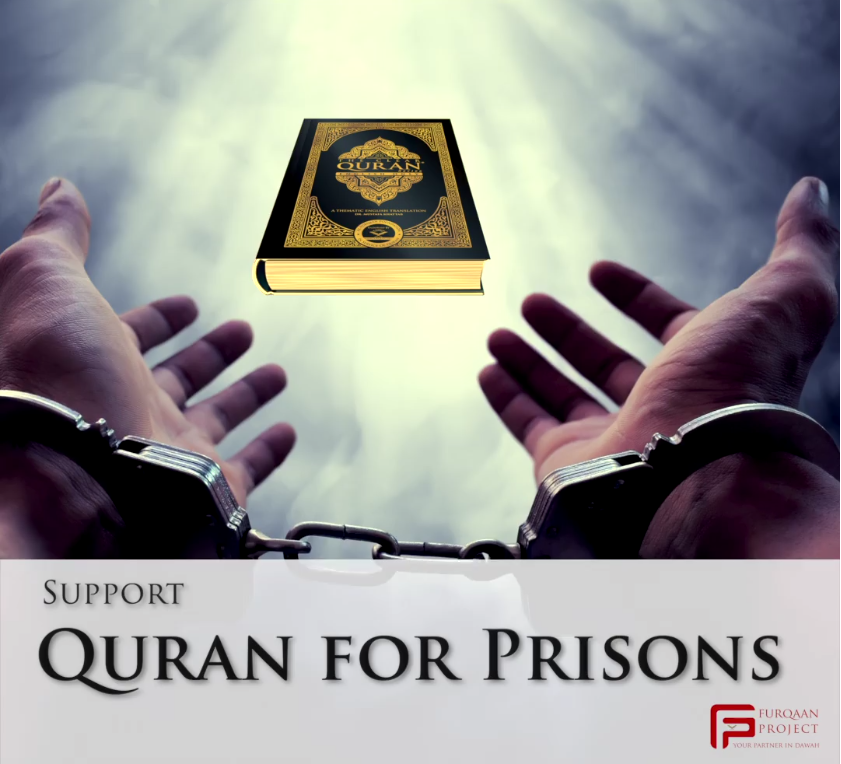Foreign Islamist regimes with a history of sponsoring terrorism, such as Qatar, appear to be spending million of dollars on proselytization and chaplaincy programs in American prisons, raising fears once again of the continued threat posed by prison radicalization.
In one particularly startling case, at least $1.6 million was provided by an Al-Qaeda connected charity run by the ruling Qatari Al-Thani family to a radical, Illinois-based Salafi group involved in proselytization and chaplaincy programs.
In a social media video published in December, the Furqaan Project, a division of the Illinois-based Al Furqaan Foundation, called on its followers to support its effort to distribute Qurans to “350,000 Muslims in American prisons.” Muslims are not the only targets of the Furqaan Project’s outreach efforts. In an earlier post, published in September 2019, the Furqaan Project also wrote of its intention to provide a Quran to “every non-Muslim man, woman, and child in America,” aiming “to reach every prison in America!”
These Qurans, however, are not just paid for through domestic fundraising, but by donations from a foreign Islamist government.
Donations of Qurans listed in the “Schedule B” of a 2016 tax return published by the Furqaan Foundation is valued at a total of $1.6 million. These donations were provided by the RAF Foundation, a Qatari regime organization based in Doha and established by the ruling al-Thani family.

The RAF Foundation’s “members,” the Counter-Extremism Project (CEP) reports, include “internationally sanctioned individuals” such as the “internationally designated terror financier Abd al-Rahman bin ‘Umayr al-Nu’aymi.”
The CEP, a partner of the U.S. State Department, adds: “Other members [of the RAF Foundation] include Mohammed Jassim al-Sulaiti, an associate of al-Qaeda financier Khalifa Muhammad Turki al-Subaiy. Sulaiti himself is accused of funneling financial transfers to alNusra Front (Hayat Tahrir al-Sham) in Syria. The charity is also accused of funding militant groups in Syria, including al-Nusra Front. The RAF Foundation is also suspected of working with individuals in Somalia linked to al-Shabaab and supporting deposed Sudanese President Omar al-Bashir.”
It remains unclear whether or not this funding is provided annually. Additional Schedule B forms for the 501c are not publicly available, and the Furqaan Foundation did not respond to phone messages from the Middle East Forum, asking if the Qatari regime or its proxies continued to fund its work.
While the distribution of Qurans may seem benign, the risk is what accompanies this effort. The Furqaan Project also directly engages with American prisoners, with some of its officials even working as chaplains.
Humayun Baksh, the “Regional Manager for the Northeast” for the Furqaan Foundation, for instance, also serves as a leading member of the New York State Chaplain Task Force, which claims to operate in New York prisons.
Videos published by the Furqaan Project show Baksh converting men to Islam, as well as interviews with “converts to Islam after spending time in prison.”

Religious work and proselytization in American prisons are nothing new. There is great concern, however, that such programs are often used by Islamist movements to front radicalization efforts – a threat discussed repeatedly over the past few decades by American and European governments. For a considerable number of “high-profile terrorists,” James Brandon notes, their “paths toward terrorism began in European or U.S. prisons.”
In January 2010, John Kerry, then chairman of the Senate Foreign Relations Committee, published a report warning that “three dozen U.S. citizens who converted to Islam while in prison have traveled to Yemen, possibly for al Qaeda training.” In a 2015 article for Harvard Kennedy School’s Belfer Center, Ayaan Hirsi Ali notes multiple additional examples, and identifies Islamist involvement in chaplaincy programs and the distribution of literature in prisons as among the leading reasons.
Although the terror ties of the RAF Foundation may well give policymakers cause for concern, at first glance, most would perhaps presume the Furqaan Foundation’s efforts in American prisons could be nothing more than simple religious outreach, not too different to that carried out by advocates for other faiths.
The Furqaan Foundation, however, has its own clear extremist links. The Furqaan Project is one of several divisions of Al Furqaan Foundation, which “was established in 2003 with mission to deliver the message of the Qur’an to every individual in America.” The foundation runs almost 20 different projects, including mosques, education services, bookstores, proselytization programs and even a private K-12 school.
One radical cleric recently connected with Furqaan is Sheikh Omar Baloch, who spews anti-Semitic rhetoric and conspiracy theories on YouTube, claiming Zionists were responsible for the 9/11 attacks, the Christchurch mosque shootings in New Zealand, and the Sri Lanka Easter bombings.
Meanwhile, the Furqaan Project is also close partners with other extremist groups, such as the Islamic Education and Research Academy (iERA). A leading British Salafi organization, the iERA is considered by British media to be one of the country’s most extreme Islamist groups, with several of its members having joined ISIS.
Given these radical activities, reformist Muslims and counter-Islamist analysts may well ask: what sort of Islam is Furqaan Foundation and its project introducing into American prisons? And does Islamist literature accompany its provision of Qurans?
Furqaan is not the only example of Qatari-based efforts to disseminate ideology within American prisons. Writing in 2018, Ahnaf Kalam examined the “Prison Initiative” program of the International Open University (also known as the Islamic Online University), a Doha-based education organization with ties to other Qatari regime funding efforts around the world.
Kalam reports the IOU was “founded by the notorious Salafi imam Bilal Philips. Philips has in the past been banned from several countries including Great Britain, Australia, Denmark, Germany, Kenya, and Bangladesh for his ‘extremist views’. He was also named as an unindicted co-conspirator in the 1993 World Trade Center bombings.”
“No less unsettlingly, Her Majesty’s Prison Service have banned Philips’s book, ‘The Fundamentals of Tauheed,’ from its detention facilities—putting it alongside other banned texts by prominent Islamist leaders Hassan al-Banna, Sayyid Qutb, and Sheikh Yusuf al-Qaradawi.”
Despite all this, as of June 2017, Kalam discovers, the Prison Initiative’s website “boasted of over 1100 registered inmates, with 500 enrolled and taking classes in 22 U.S. states.”
The Qataris may not be the only foreign Islamist government working to advance Islamism in Western prisons.
In 2019, German media revealed that in just the state of North Rhine-Westphalia, 97 of the 114 prison chaplains were employees of the Diyanet, a Turkish governmental institution used to control and propagate Turkish regime Islamism, and even to spy on Turkish dissidents and critics of Erdoğan. When the state government instituted a requirement for security checks, the Turkish consulate refused to permit the chaplains to be interviewed.
There is some evidence of the Diyanet also aiming to work in U.S. prisons. A December 2021 event on “advocacy” for Muslims in American prisons, hosted by the Diyanet Center of America – the most prominent Turkish regime institution in North America – was organized in partnership with the “Maryland Muslim Prisoner Project” and the Maryland office of the Council on American-Islamic Relations (CAIR).
Sam Westrop is director of Islamist Watch, a project of the Middle East Forum
